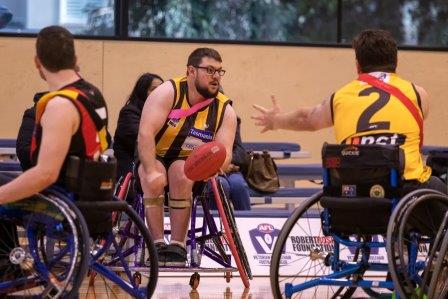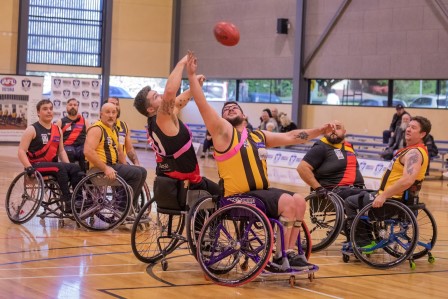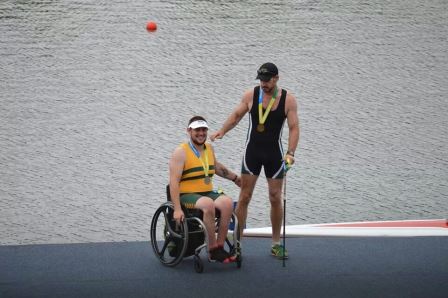
Joe playing VWFL competition wheelchair football
Photo: Joe Chivers
Joe Chivers tells his story of playing elite competition wheelchair football with VWD.
My name is Joe. I am from Tasmania, I am 31 years old and I have von Willebrand disease (VWD). Following a skydiving accident ten years ago I became a L1 incomplete paraplegic. I currently work for ParaQuad Tasmania as the Wheelchair Sport in Schools Facilitator.
I was in primary school and very young when I found out that I had VWD. I injured myself when I reached down to pick up a book under a tree. A stick pierced the top of my head which led to a large bleed and I was rushed to hospital. After my wound had been treated, I was tested for bleeding disorders and the test came back positive for VWD.
Von Willebrand disease has impacted on my life in several ways. Some of the negative impacts have been easy bruising, internal injuries, complications during surgeries and a tendency to be injured easily during sport or physical activities. The positive impacts far outweigh the negative though. I have been able to understand myself and my boundaries far earlier in life. I have met a lot of fantastic people who live with bleeding disorders and learnt some fantastic life lessons from them.
I have played a lot of sport in my life. I am very lucky to be a talented athlete in numerous sports. I play wheelchair Aussie Rules Football and have been drafted by the Hawthorn Football Club to participate in the VWFL during its second season. I have also played Para Ice Hockey for Australia at the 2018 C-Pool World Championships.
I have always loved playing football. From a very early age, I wanted to play at an elite level. At the time of my accident, I was very fit and was training 5 to 6 nights per week. When I became a paraplegic, I thought my sporting days were over, which was extremely difficult for me to comprehend.
Fast forward a few years and here I am playing at an elite level for a great club in Hawthorn. It is such a fully inclusive sport and people can play regardless of their ability or whether they live with disability or not.

Joe playing VWFL competition wheelchair football
Photo: Joe Chivers
We play on a basketball court, and there are 5 players per team. A handball counts as a kick and an underarm throw is a handpass. I play as a centre, meaning I can go anywhere on the court. The forwards are the only players who can score but both they and the defenders can only go into the first two-thirds of the court, like netball. Tackling is replaced with a touch on the shoulder to minimise contact and create a safer and fairer sporting environment.
The wheelchairs are specifically designed for use in sports. The wheelchairs that we use in everyday life are a lot more fragile and are susceptible to breaking during sporting activities, which would then impede our daily living. Sports chairs have a lot more camber on the wheels to make them more agile and safer. There are also 4 smaller anti-tip wheels attached to make them as safe as possible at high speeds. The frame of a sporting wheelchair is reinforced to bear the brunt of any big collisions and to make sure the user is safe.
I love the speed of the game as well as the physicality. Plus, to play at a high level, you need to be skilled in both operating a sports wheelchair and handling a football. We still need to bounce the ball, as able-bodied players do, and deliver precise hand balls and passes.
My bleeding disorder hasn't been too difficult to manage during the season. I am very lucky that my treatment plan is very simple. I make sure that I have enough medication at home in case of an emergency. During competitions I have a letter from my haematologist and GP with me and have a card in my wallet with my medical details to assist medical professionals in the event that something does happen or I have a bleed. The club is aware of my medical history in case of an emergency.

Joe being awarded a silver medal for the national rowing championship in 2013 as part of the TA (Trunk and Arms) classification
Photo: Joe Chivers
Get out there and try new things. Live life to the fullest but be smart about it. If there is a new activity that you would like to try, make an educated decision. Speak to current participants or people who have tried it before, research the activity and speak to medical professionals about whether it may or may not be suitable for you. Seek knowledge and you will discover so much about yourself and others in the process. And don't be afraid to fail. You will learn more by failing than you will by succeeding every time.
Live life to the fullest. Regardless of your ability in life, you can still live, love, laugh and learn.
Haemophilia Foundation Australia acknowledges the Traditional Owners and Custodians of Country throughout Australia, the land, waters and community where we walk, live, meet and work. We pay our respects to Elders past and present and extend that respect to all Aboriginal and Torres Strait Islander peoples.
Sign up for the latest news, events and our free National Haemophilia magazine